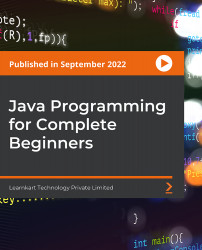در حال حاضر محصولی در سبد خرید شما وجود ندارد.

Java programming language is very powerful and scalable and is used to create different software applications. The main reason many companies use Java is its popularity and usage in the industry. According to many official websites that track the popularity of languages, Java is either #1 or in the top 3. So, that means more companies and their staff are using it, so there are more career opportunities available for you if you are skilled in the language. You will start by understanding all the core OOPS concepts, what polymorphism and inheritance is, and apply them to your application. You will also learn all the essential Java keywords, operators, statements, loops, and expressions. You will understand how to download and install all the necessary coding tools and learn to perform code refactoring. Along the course, you will learn how to use different packages available. You will learn the concepts and usage of multithreading. Learn how to analyze logs and explore Java debugging techniques such as stack trace and breakpoints. You will also learn how to use the JUnit framework and implement Java design patterns. By the end of this course, you will have understood the building blocks of Java programming language. All resources and code files are placed here: https://github.com/PacktPublishing/Java-Programming-for-Complete-Beginners
در این روش نیاز به افزودن محصول به سبد خرید و تکمیل اطلاعات نیست و شما پس از وارد کردن ایمیل خود و طی کردن مراحل پرداخت لینک های دریافت محصولات را در ایمیل خود دریافت خواهید کرد.
